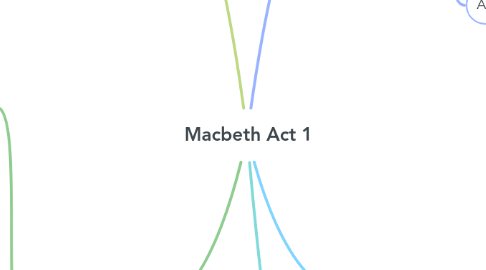
1. The Witches
1.1. Misleading and the Source of Chaos
1.1.1. "All hail, Macbeth! that shalt be king hereafter!" The witches promise Macbeth that he shall be king, however they withold vital information about how he will come to be king. They tuant Macbeth with these extravagant possibilities. These become so real in Macbeth's mind that he is extremely dissapointed when King Duncan announces who will be heir. "The Prince of Cumberland! -That is a step On which I must fall down, or else o'erleap, For in my way it lies." Macbeth's dispirited thoughts are what promt him to murder the king. Thus, fullfilling the witchs' intentions of creating turmoil and disorder.
2. Lady Macbeth
2.1. Manipulative and Evil
2.1.1. After hearing Macbeth's urge not to bring harm to King Duncan, Lady Macbeth attempts to manipulate him into doing it anyway. "Wouldst thou have that which thou esteen'st the ornament of life, And live a coward in thine own esteem, Letting 'I dare not' wait upon 'I would', Like the poor cat i' the adage?"
2.2. Valiant, Manful and Determined
2.2.1. Lady Macbeth is a greatly misunderstood character, thought to be evil and wicked, when in fact she is a brave and courageous woman in the way she faces her problems. "Come, you spirits That tend on mortal thoughts, unsex me here, And fill me, from the crown to the toe, top-full of direst cruelty!" Her violent, blistening soliloquies show her strength of will, which eclipses that of Macbeth. She is determined to do whatever it takes to reach her goals. She believes that only a man can murder, shown by the words "unsex me here", yet she still assists her husband as she knows that he lacks have the resolve to kill the king. She decides to put her femininity/ womanhood/ weakness aside so that she can do the bloody deeds necessary to seize the crown.
3. Macbeth
3.1. Courageous and Loyal
3.1.1. " As sparrows eagles, or the hare the lion". This line compares the fear that Macbeth felt during battle, to the fear, or lack thereof, a lion would have when faced with a rabbit.
3.1.2. "First, as I am his kinsman and his subject, strong both against the deed: then, as his host, Who should against his murderer shut the door, Not bear the knife myself." Macbeth is trying to persuade not only Lady Macbeth but also himself, to not bring harm to the king.
3.2. Ambitious and Full of Desire
3.2.1. “This supernatural soliciting Cannot be ill; cannot be good: - if ill, Why hath it given me earnest of success commencing in a truth?” During the 17th century, when the play was written, anything to do with the occult was considered evil and not to be associated with. Although Macbeth is fully aware of this, he’s too tempted by the possibilities of the witches’ prophecy becoming a reality. Macbeth tries to justify why the witches’ predictions may not be evil if the prophesy is only about his success.
4. Duncan
4.1. Naive and Trusting
4.1.1. "There's no art To find the mind's construction in the face: He was a gentleman on whom I built An absolute trust." Duncan is refering to the prior Thane of Cawdor who was recently exposed as a traitor to the kingdom. Duncan's words display his naivity and vulnrability to deception. Duncan places too much trust in the loyalty of his subordinates and this is what ultimately leads to Macbeth being able to murder the king without much difficulty.
5. Banquo
5.1. Principled, Strong Sense of Morals
5.1.1. “…..And oftentimes, to win us to our harm. The instruments of Darkness tell us truths; Win us with honest trifles, to betray’s. In deepest consequence”. When the witches announce that Macbeth is to be the new Thane of Cawdor, Banquo is consious of the possibility that the witches' prophesy may have dark / evil intentions. So much so, that he expresses his concerns to Macbeth.
